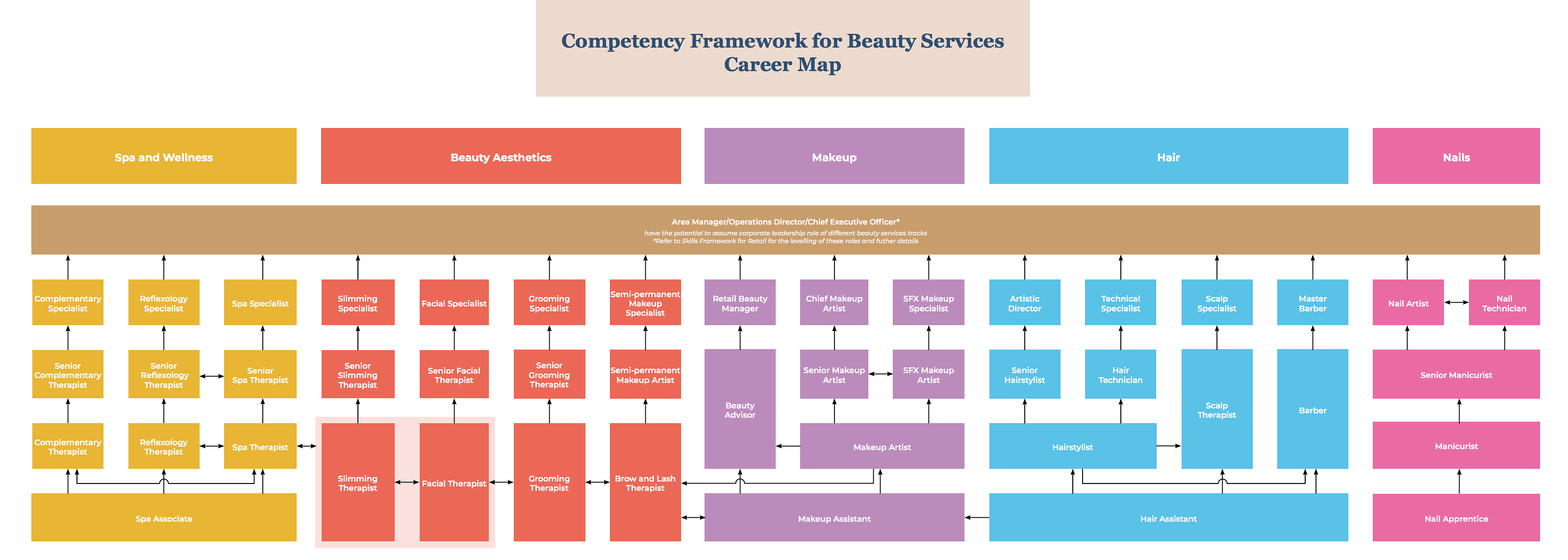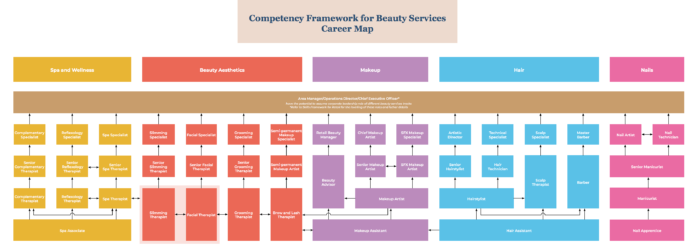SINGAPORE: A new “competency framework” is expected boost employment for locals in the beauty services industry by 30 per cent in the next five years, a figure that translates to 2,000 to 3,000 more jobs, says the Beauty Services Alliance (BSA).
The BSA on Wednesday (Aug 26) launched the new framework, supported by Enterprise Singapore (ESG) and SkillsFuture Singapore, aiming to “attract and build a skilled and future-ready workforce”, and “ensure consistent service standards”.
About 40 per cent of employees in the beauty services industry now are locals, said BSA spokesman Simon Lee. “But of this 40 per cent, we haven’t taken into account the freelancers that are moving around in the market.”
READ: The Big Read: Kept afloat by government lifelines, will ‘zombie companies’ haunt Singapore?
“STRONG DEMAND” DESPITE PANDEMIC
Speaking at the launch, Minister of State for Trade and Industry Low Yen Ling said: “Although COVID-19 has led to many challenges for the beauty services industry, we’re convinced and assured that there remains strong local demand as people still want to look good and feel great. And in fact, given the current travel restrictions, more people are having to look for spa and beauty services locally.”
This continued demand, Ms Low said, would spur job growth in the industry. Combined with “a good level” of customer confidence and assurance in local establishments, an industry-wide competency framework would “set the foundation and structure for businesses, for the employers and also the employees in the sector to upskill, to re-skill and to stay relevant with new knowledge.”
The beauty services industry in Singapore generates about S$2 billion in operating receipts, comprising about 6,000 enterprises that employ more than 13,000 workers, said Ms Low.
The industry has also been expanding at a rate of more than 10 per cent year-on-year, she added. “It is not only a large industry, it is one with a strong growth potential.”
In a separate press release on Wednesday, BSA said the local beauty services industry currently faces challenges in attracting local talent and upskilling workers to identify with emerging trends and embrace technology.
CAREER PROGRESSION
The Alliance, established in July 2019, is made up of five trade associations in the beauty services industry representing about 700 enterprises – the Complementary Wellness Association (International), Hair and Cosmetology Association Singapore, Nailist Association for International Licenses Singapore, Spa Professionals Association of Singapore and Spa and Wellness Association Singapore.
The competency framework will serve as “a single reference point” for all operators across the spa and wellness, beauty aesthetics, makeup, hair and nails sectors, said BSA in the press release. Career progression pathways are now mapped out, covering 45 job roles across five tracks.

Chart showing career progression in Singapore’s beauty services industry. (Graphic: Beauty Services Alliance)
“From the perspective of more than 13,300 beauty services employees nationwide, the framework allows them to make informed choices on employment opportunities, training, career development and progression,” said BSA.
Addressing the industry’s difficulties in attracting local talent, Mr Lee of BSA said: “Currently, we do not have a clear picture in our industry. What are the routes, what are the pathways, what are the end goals that they can reach?
“But with these pathways, I’m sure the industry has a clearer vision of where they’re going to meet at the end of the day, or how they want to move beyond it, as compared with the overseas guidelines that we have received and understudied.”
IMPROVING THE INDUSTRY’S IMAGE
Ms Rachel Tang, founder of Nailist Association for International Licenses Singapore noted that the image of the beauty services industry is another challenge. “Beauty therapists or professionals in the beauty service industry have all along not really had a very good image, which we are trying to change with this framework, so that we can bring professionalism and status into what we do.
“We are not just providing the service. We are also able to give consultations and more professional skills,” she added, noting that the framework has different tiers that illustrate how employees can progress from service staff to management roles.
“Moving forward, this is very important because with the image of the individual professions uplifted, then we can attract more young people into this trade, so they can see that there’s actually a progression in the career for these beauty services,” said Ms Tang.
Following the launch of the competency framework, BSA will work closely with various Government agencies on other efforts to advance the sub-industries, said the alliance in the press release.
“These will include an accreditation system for training providers, an evaluation system for learners, as well as plans to raise awareness and drive industry-wide adoption of all initiatives.”





